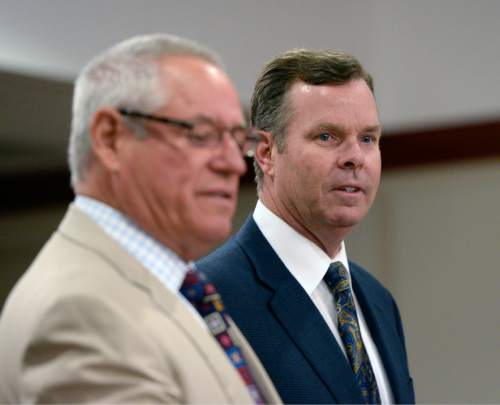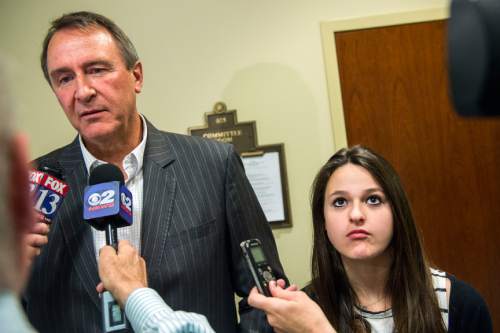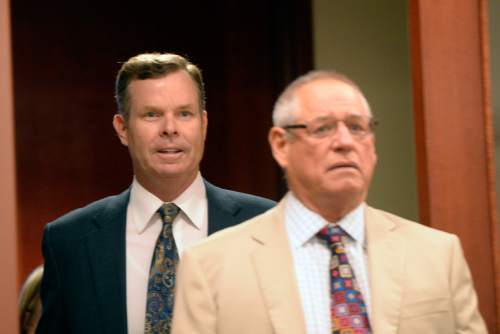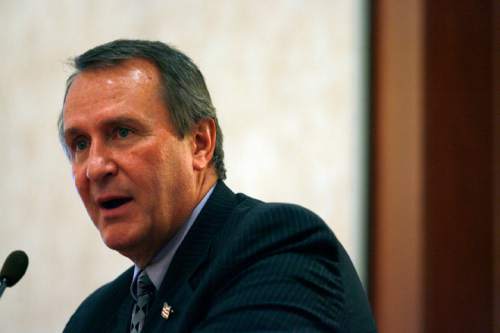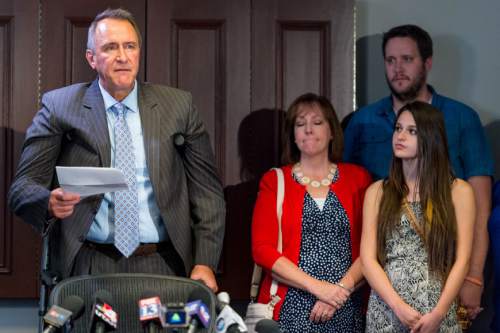This is an archived article that was published on sltrib.com in 2014, and information in the article may be outdated. It is provided only for personal research purposes and may not be reprinted.
Davis County Attorney Troy Rawlings — who is prosecuting Mark Shurtleff — has asked a judge to dismiss a racketeering charge, one of 10 criminal counts filed against Utah's former three-term attorney general.
A review of current case law, as well as pleadings by Shurtleff's attorneys, convinced Rawlings that the charge should be dismissed, he wrote in a motion filed Wednesday in 3rd District Court.
The state is "not persuaded it has a reasonable probability of convicting this defendant" on the charge of participating in pattern of unlawful conduct, the motion states.
Prosecutors have not disclosed the specifics of the evidence that originally prompted the charge.
Utah's attorney general for a dozen years, Shurtleff and his handpicked successor, John Swallow, were charged in July with a combined 23 criminal counts. If convicted, each man could face prison terms of up to 30 years.
Rawlings cited language from a 2004 Utah Court of Appeals case, which says that merely paying one's personal bills with the proceeds from unlawful activity does not qualify as racketeering.
The Court of Appeals decision said that a so-called RICO violation — from a federal law known as the Racketeer Influenced and Corrupt Organizations Act — occurs only when a person uses or invests the profits or proceeds of a criminal activity to acquire, establish or operate an illegal enterprise.
The motion also states, however, that Rawlings intends to file amended charges in the case soon and may also "revisit" the racketeering issue if new evidence surfaces.
Rawlings declined to comment Wednesday.
From the outset, Shurtleff's defense team questioned whether the state had sufficient facts to file a RICO charge. Attorney Richard Van Wagoner said he made that point in court filings and in previous conversations with Rawlings.
Van Wagoner said he believes Rawlings evaluated the evidence and acted in the best interest of justice in deciding to drop the RICO count.
"Now that doesn't mean he can't bring it back again," Van Wagoner said, noting that Rawlings is expected to file amended charges against his client. "So, one down and how many to go? We don't know."
Swallow, who resigned as attorney general amid the criminal investigation, also faces a racketeering charge.
His attorney, Stephen McCaughey, said he doesn't believe the RICO charge was appropriately filed in his client's case, because he doesn't believe any "enterprise" existed as the term is defined under the law.
"I'm a little surprised they did not dismiss the charge in the Swallow case, but it seems like the two different prosecutors have two differing opinions," McCaughey said. "We'll have to deal with it going forward."
The RICO motion comes on the heels of a request filed Tuesday in which Rawlings and Salt Lake County District Attorney Sim Gill asked 3rd District Judge Elizabeth Hruby-Mills to allow Shurtleff and Swallow to be prosecuted separately.
That division would include splitting the lead prosecutorial responsibilities — with Gill handling the Swallow side and Rawlings taking over the Shurtleff case.
"It's a resource issue, and it's a division-of-labor issue," Gill said Tuesday. "We will continue to collaborate."
Hruby-Mills has not yet issued an order on the request to separate the case. The next hearing is set for Dec. 12.
Gill, a Democrat, and Rawlings, a Republican — with help from federal and state agents — worked together to bring charges against the two former GOP attorneys general.
Prosecutors allege that Swallow and Shurtleff established a pay-to-play culture inside the Utah attorney general's office, which included taking bribes to ignore or protect big campaign donors whose business practices landed them in legal trouble. The charges followed months of investigative work by county, state and federal authorities, state lawmakers and the lieutenant governor's office.
In addition to the racketeering count, also known as engaging in a pattern of unlawful activity, Shurtleff, 57, is charged with nine other felonies, including receiving or soliciting bribes, accepting gifts, and tampering with witnesses and evidence.
Swallow, 52, is charged with 11 felonies and two misdemeanors, including multiple counts of receiving or soliciting bribes, accepting gifts, tampering with evidence, obstructing justice and participating in a pattern of unlawful conduct.
Both former attorneys general have proclaimed their innocence.
Lawyers for Swallow and Shurtleff have asked the judge to direct prosecutors to produce a "Bill of Particulars," spelling out which acts led to the felony counts their clients face. Prosecutors have resisted, arguing a request for such a list is allowed only after the defendant is ordered to stand trial.
@jenniferdobner


